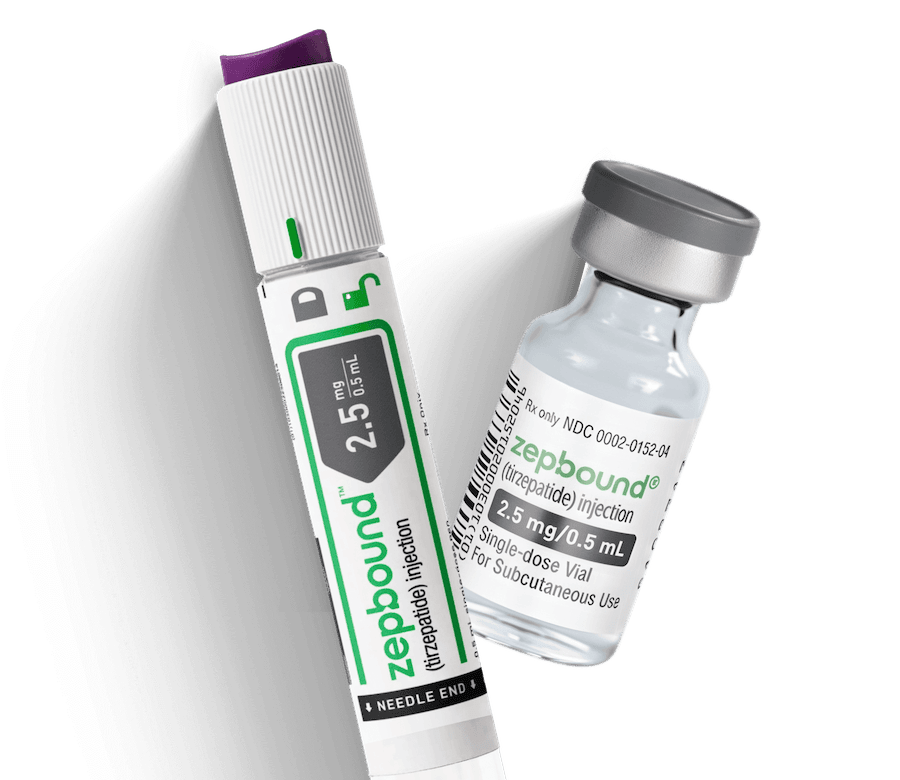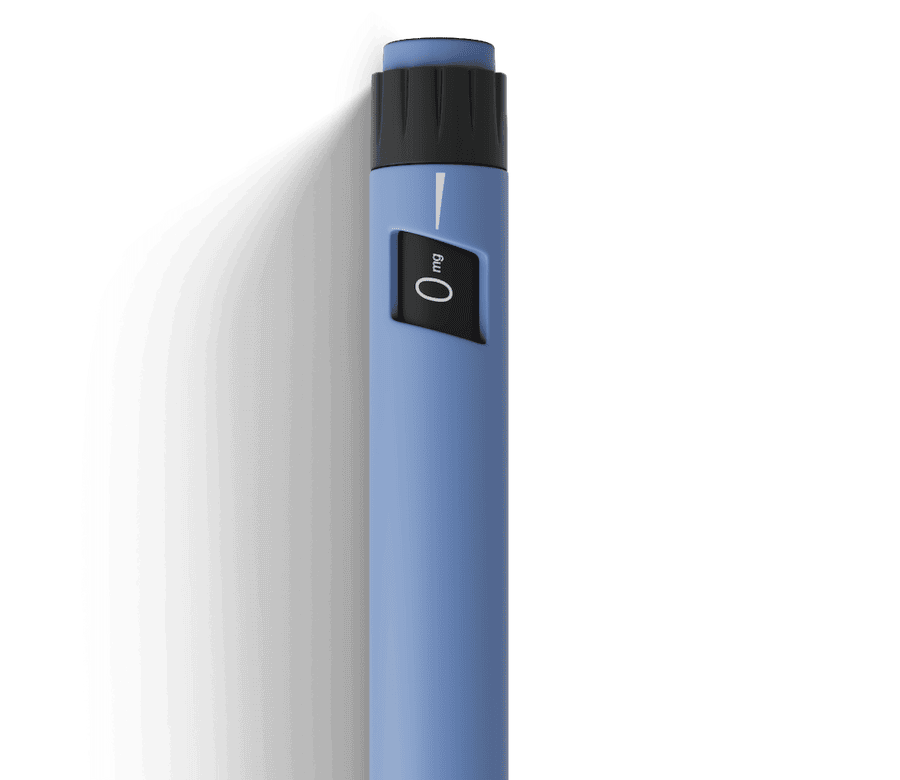What you’ll learn:
- Phentermine is typically prescribed for short-term weight loss, up to 3 months. It can also be prescribed off-label for longer use in some cases.
- Common side effects include dry mouth, insomnia, dizziness, headache, and fatigue. More severe side effects are possible, though rare.
- Compared to GLP-1s, phentermine causes more stimulant-related side effects, while GLP-1s more often lead to digestive issues.
While GLP-1 medications like Wegovy® and Zepbound® have been in the news for their impressive weight loss results, they aren’t the only options. For those who prefer a pill over an injection, phentermine is a long-standing alternative.
First approved in 1959, phentermine is prescribed as a short-term weight loss aid—typically up to 12 weeks, though some doctors may continue it off-label. It’s also FDA-approved for longer use in Qsymia®, which combines phentermine with topiramate.
Because phentermine works differently from GLP-1s, its side effects are also different. Instead of mimicking gut hormones, it stimulates the central nervous system to reduce appetite. This makes it easier to follow a lower-calorie diet and stick with lifestyle changes.
In this article, we’ll cover the most common side effects of phentermine, the rare but more serious risks, how they compare with GLP-1 medications, and what you can expect while taking it.
How phentermine affects your body
Phentermine works by changing the brain’s appetite signals to dial back your hunger. It does this by boosting levels of neurotransmitters like norepinephrine and, to a smaller degree, dopamine, and serotonin. These chemicals affect areas in your brain linked to appetite, helping you feel full with less food.
Phentermine activates parts of your nervous system that control alertness and energy. This is what helps quiet appetite signals, but it’s also why some people notice side effects like a racing heartbeat, restlessness, or trouble sleeping.
Phentermine is FDA-approved for short-term use, usually up to 12 weeks. More recent studies suggest some people may tolerate it safely beyond three months, but extended use remains off-label and should only happen under a provider’s close supervision.
For those who need longer-term support, there’s Qsymia®. This medication combines phentermine with topiramate, another drug shown to affect appetite and cravings. Together, they create a more sustainable treatment option that’s FDA-approved for chronic weight management, offering more lasting results compared to phentermine alone.
How much weight can you lose with phentermine?
According to a study, phentermine, when taken for up to 12 weeks, can help people lose about 5% of their starting weight, with weight loss beginning within the first two weeks. It’s a short-term tool meant to be paired with healthy diet and activity changes for the best effect.
How about with Qsymia®?
Qsymia® is designed for longer-term treatment. In clinical studies lasting a year, average weight loss was around 10% at the maximum dose of 15 mg/92 mg. That’s roughly double what’s seen with short-term phentermine use.
Common side effects of taking phentermine
Side effects with phentermine are most often noticed when first starting the medication. In one clinical trial, the most reported symptoms were dry mouth and insomnia.
A few participants experienced more severe symptoms, but those improved once their dose was cut in half. While this suggests that side effects may sometimes ease with a smaller dose, the present data are too limited to confirm whether they are consistently dose-related.
A broader review also noted that phentermine is generally well tolerated, with most side effects showing up early in treatment and improving over time. The most frequently mentioned issues were insomnia, irritability, dizziness, and cardiovascular-related effects like increased heart rate or palpitations.
Below is a closer look at these common symptoms and general management tips:
- Why it happens: Phentermine is a stimulant that can reduce saliva production as part of its effect on the nervous system.
- What to do: Sip water often, chew sugar-free gum, or keep lozenges handy to stay comfortable.
- Why it happens: The stimulating effect can make it harder to fall or stay asleep, especially if taken too late in the day.
- What to do: Take your dose early in the morning and build a calming bedtime routine to help your body wind down.
- Why it happens: Changes in blood pressure or nervous system stimulation can sometimes trigger headaches.
- What to do: Stay hydrated, limit screen strain, and rest in a dark, quiet space if headaches flare up.
Increased heart rate and palpitations
- Why it happens: As a sympathomimetic, phentermine can raise heart rate and cause noticeable pounding or fluttering in the chest.
- What to do: Track your heart rate, limit caffeine, and call your provider if these symptoms don’t settle down.
- Why it happens: Stimulants can sometimes heighten nervous energy or affect mood.
- What to do: Use relaxation techniques like deep breathing or light exercise, and check in with your provider if it feels overwhelming.
Digestive changes (constipation)
- Why it happens: Digestive issues are less common with phentermine than with GLP-1 medications. When they do happen, they’re often linked to appetite suppression or changes in eating patterns rather than the drug itself.
What to do: Eat smaller, balanced meals, gradually add fiber to your diet, and drink plenty of water throughout the day. - If any symptom feels more intense than expected or doesn’t ease up, it’s best to check in with your healthcare provider. They can guide you on whether a dose change, a different schedule, or another medication option might be a better fit for your goals.
Side effects of stopping phentermine
Stopping phentermine doesn’t typically lead to withdrawal symptoms. Research shows that even people who took it for years at higher-than-usual doses didn’t develop dependence or cravings. And stopping it without tapering didn’t trigger amphetamine-like withdrawal.
The main thing people notice after stopping is a return of appetite, since the medication is no longer helping to suppress hunger. For this reason, it’s still a good idea to stop under your provider’s guidance, so they can help you plan next steps for managing weight without the medication.
Are there side effect differences with Qsymia®?
Phentermine and Qsymia® share some similarities since Qsymia® contains phentermine, but adding topiramate introduces its own set of effects. Here’s a quick comparison:
Similarities (from phentermine):
- Dry mouth and constipation: Both phentermine and Qsymia® users often report these digestive issues.
- Insomnia and restlessness: Trouble sleeping and feeling “wired” can happen with either, since phentermine is a stimulant.
- Dizziness and fatigue: These show up in both groups, usually early on.
Differences with Qsymia® (from adding topiramate):
- Tingling sensations (paresthesia): More common with Qsymia®, linked to topiramate.
- Taste changes: Food or drinks may taste unusual or “flat,” a side effect not seen with phentermine alone.
- Cognitive effects: Some Qsymia® users report issues with focus or memory, reflecting topiramate’s effect on the nervous system.
- Mood changes: Anxiety, depression, or irritability appear more often with Qsymia® than with phentermine alone.
Qsymia® has a broader side effect profile due to the addition of topiramate, but it also allows for longer use and greater weight loss on average compared to phentermine alone. If you’d like a deeper dive, you can check out our full guide on Qsymia® side effects.
Do females experience different side effects with phentermine?
There aren’t any side effects from phentermine that have been shown to happen more often in females, but research is limited since most studies don’t break results down by sex.
What is clear is that phentermine shouldn’t be used during pregnancy. If you become pregnant while taking phentermine, your doctor will likely stop the medication right away. It also shouldn’t be used while breastfeeding.
Rx weight loss, the right way, with Noom
Get access to prescription weight loss medication with Noom.Severe side effects and warnings for phentermine
Phentermine is usually well tolerated, but there are times when side effects are more serious and need immediate attention. Severe side effects to watch out for include:
- Increased blood pressure or heart rate: Call your doctor if you notice a racing heartbeat, palpitations, or blood pressure that stays elevated.
- Chest pain or shortness of breath: Get emergency care if you develop chest pain, breathing problems, or swelling in your ankles or legs.
- Reduced exercise tolerance: If you feel unusually tired, get winded easily, or notice a drop in stamina during normal activity, contact your provider.
- Severe restlessness or mood changes: Sudden agitation, nervousness, or noticeable mood swings should be discussed with your doctor right away.
- Persistent insomnia: If sleep problems continue and interfere with daily life, reach out to your provider, as they may need to adjust or stop your prescription.
- Allergic reactions: Rash, swelling, or trouble breathing are reasons to seek emergency care immediately.
- Misuse and dependence concerns: Watch for signs like feeling unable to go without the medication, taking more than prescribed, or craving the drug. Let your provider know right away if these issues arise.
Stay in close contact with your provider during treatment, and never ignore new or worsening symptoms.
Who shouldn’t take phentermine?
Phentermine isn’t a fit for everyone, and the prescribing information outlines a few important situations where it shouldn’t be used. You shouldn’t take it if you:
- Have heart problems: People with heart disease, uncontrolled high blood pressure, irregular rhythms, or a history of stroke should avoid it.
- Have glaucoma: Phentermine can raise eye pressure, making this condition worse.
- Have thyroid disorders: If you have an overactive thyroid, phentermine isn’t recommended.
- Have recently used an MAOI: Anyone who has taken an MAOI antidepressant in the past 14 days should not use phentermine.
- Have allergies: If you’ve ever had a reaction to phentermine or its ingredients, it isn’t safe.
- Are pregnant or breastfeeding: Phentermine should not be taken if you are pregnant or nursing.
If any of these apply to you, phentermine isn’t the right choice. Your provider can recommend safer alternatives that still support your weight-loss goals.
Comparing phentermine and GLP-1 medications
Phentermine and GLP-1 medications both help with weight loss, but the way they act in the body explains why their side effects look so different. Seeing the two side by side makes it easier to understand what to expect with each. While all experiences vary, here’s a general key based on how often these side effects appear in clinical trials:
- Likely = occurs in more than 30% of people
- Possible = occurs in 5 to 30% of people
- Unlikely = occurs in less than 5% of people
| Side effect | Phentermine | GLP-1 medications (e.g., semaglutide, tirzepatide) |
|---|---|---|
| Dry mouth | Likely | Unlikely |
| Insomnia | Likely | Unlikely |
| Headaches | Likely | Possible |
| Dizziness | Likely | Possible |
| Irritability | Likely | Unlikely |
| Increased heart rate/palpitations | Likely | Possible |
| Nausea | Unlikely | Likely |
| Vomiting | Unlikely | Likely |
| Diarrhea | Unlikely | Likely |
| Constipation | Possible | Likely |
What explains the difference in side effects?
Phentermine acts on the central nervous system, so stimulant-like effects such as dry mouth, insomnia, palpitations, or dizziness are the most common.
GLP-1 medications act like the hormone GLP-1 (glucagon-like peptide-1). This hormone influences several parts of the body:
- In the digestive system, GLP-1 slows stomach emptying, which can help people feel full longer but often leads to side effects like nausea, vomiting, or diarrhea.
- In the brain, GLP-1 receptors help regulate appetite, reducing overall food intake.
- In the pancreas, GLP-1 enhances insulin release and reduces glucagon, supporting better blood sugar control.
Because of these combined effects, the most common side effects of GLP-1 medications are gastrointestinal, while their impact on appetite and metabolism comes from signaling in the brain and pancreas.
Weight loss potential: Phentermine, Qsymia®, and GLP-1s
When thinking about side effects, it also helps to weigh them against the results you can realistically expect. Not all medications produce the same level of weight loss, and that context can make it easier to decide which trade-offs feel worthwhile.
The data below comes from clinical trials using the maximum approved doses for each drug:
| Medication | Effectiveness |
|---|---|
| Phentermine (37.5 mg) | 5% (12 weeks) |
| Phentermine/topiramate ER (15 mg/92 mg) – Qsymia® | 10% (56 weeks) |
| Semaglutide (2.4 mg) – Wegovy® | 15% (68 weeks) |
| Tirzepatide (15 mg) – Zepbound® | 21% (72 weeks) |
Frequently asked questions (FAQs) about phentermine
If you’re considering phentermine for weight loss, it’s natural to have a few quick questions about what to expect. Here are answers to some of the most common ones.
How quickly do you lose weight on phentermine?
Most people notice weight loss within the first few weeks. Clinical studies show that people taking phentermine for up to 12 weeks lost about 5% of their starting weight on average.
How long do phentermine side effects last?
In clinical trials, some symptoms continued beyond four weeks, though most were mild to moderate and may improve as your body adjusts. If side effects don’t ease up or start to feel difficult to manage, your provider may adjust your dose or change the timing of when you take it.
Which is better, Wegovy®/Zepbound® or phentermine?
It depends on your goals and how long you want to stay on medication. Phentermine is short-term (12 weeks or less) and helps jumpstart weight loss, while GLP-1s like Wegovy® and Zepbound® are approved for long-term use and often lead to greater weight loss over time—up to 15–21% on average in clinical trials compared to about 5% with phentermine alone.
Is there a generic for phentermine?
Yes. Phentermine is widely available in generic forms, including tablets, capsules, and orally disintegrating tablets (ODTs). The most common strengths are 15 mg, 30 mg, and 37.5 mg. Lomaira™ (8 mg) is brand-only and does not currently have a generic equivalent.
How much is phentermine a month?
Retail prices for phentermine are relatively affordable compared to newer weight-loss drugs. On average:
- Generic phentermine (15 mg, 30 mg, or 37.5 mg tablets/capsules): about $37–$41/month
- Lomaira™ (8 mg tablets): about $28/month
Prices can vary depending on your pharmacy, insurance coverage, or use of discount programs.
The bottom line: The takeaway on phentermine side effects and safety
Phentermine has been around for decades as a short-term weight-loss option, typically prescribed for up to 12 weeks. It works by stimulating the central nervous system to suppress appetite, which makes it easier to stick with calorie reduction and lifestyle changes. Most people tolerate it well, with the most common side effects being dry mouth, insomnia, irritability, and an increased heart rate. Constipation can also occur, though digestive issues are far more characteristic of GLP-1 medications than phentermine. Severe side effects are possible but rare, and phentermine is generally considered safe when taken as prescribed and under medical supervision.
Compared to GLP-1s like Wegovy® and Zepbound®, phentermine offers a lower-cost, pill-based alternative for people seeking short-term support. GLP-1s often lead to more weight loss and are approved for long-term use, but they come with a higher likelihood of gastrointestinal side effects and require injections. For some, phentermine may be a useful jumpstart or bridge medication; for others, GLP-1s may be a better fit for sustainable results. Either way, the decision is best made with your healthcare provider, weighing effectiveness, side effects, cost, and personal health goals.
If you’re considering long-term weight management, see if you qualify for Noom Med*. You’ll be connected with a clinician who can assess whether weight loss medication is right for you and prescribe one of several options if needed. Your medication treatment will be paired with Noom’s behavioral tools and expert coaching, creating a plan that supports both short-term progress and lasting change.
Note: Phentermine or phentermine-containing products like Qsymia can only be prescribed by a physician you can see physically in a clinic and not through telehealth with Noom Med.
Why you can trust us
At Noom, we’re committed to providing health information that’s grounded in reliable science and expert review. Our content is created with the support of qualified professionals and based on well-established research from trusted medical and scientific organizations. Learn more about the experts behind our content on our Health Expert Team page.






















 Noom Team
Noom Team
 Shoshana Fishbein
Shoshana Fishbein


 Meaghan Cameron
Meaghan Cameron